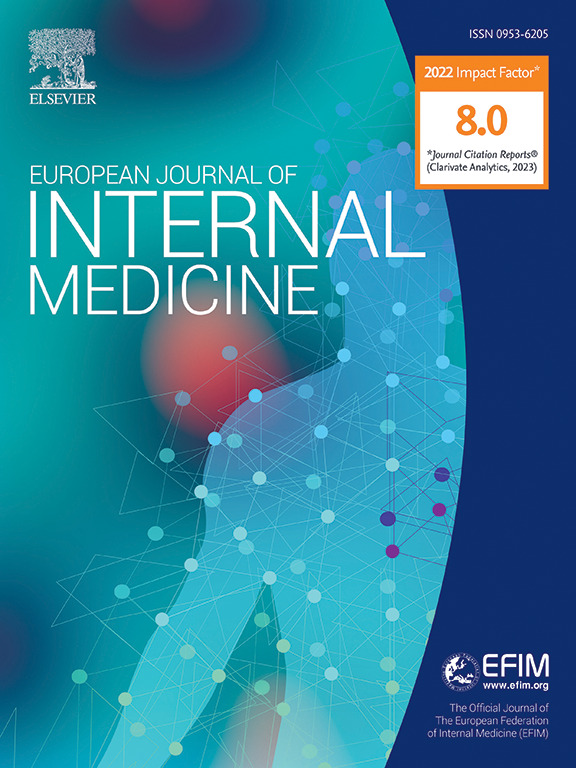Impact of L-arginine and liposomal vitamin C supplementation on quality of life and daily life activities in patients with COPD: a randomized, multicenter, single blind, placebo-controlled trial (ILDA study)
IF 5.9
2区 医学
Q1 MEDICINE, GENERAL & INTERNAL
引用次数: 0
Abstract
Objective
Chronic Obstructive Pulmonary Disease (COPD) patients experience limitations in activities of daily living (ADL) despite optimal inhaled treatment. L-arginine depletion is associated with poor exercise performance. Our aim was to assess whether oral L-arginine supplementation improves dyspnea and ADL in COPD patients.
Design and Methods
Randomized, multicenter, single blind, placebo-controlled study (NCT05412160). Stable COPD patients received L-arginine (1.66 g) plus liposomal vitamin C (500 mg) twice daily or placebo for 4 weeks. At baseline (T0) and after treatment (T1) lung function, six minutes walking test (6MWT), dyspnea and ADL perfomance, evaluated through: COPD assessment test (CAT), self-administered chronic respiratory questionnaire (CRQ-SA), Clinical COPD Questionnaire 24 h and 7 days (CCQ) and London Chest Activity of Daily Living Scale (LCADL) -were assessed. The primary endpoint was CRQ score change compared with placebo.
Results
150 patients were enrolled (67 % males, median FEV1 57 %predicted), with 76 receiving L-arginine. Baseline characteristics and questionnaire scores were balanced between arms. At T1, L-arginine patients demonstrated significant improvements compared to placebo in CRQ total score (median (IQR) 3.5 (0.0;6.75); P = 0.006), CRQ dyspnea domain (3.0 (0.0;6.0); P < 0.001); LCADL total score (-1.0 (-3.0;0.0); P = 0.005); LCADL housework (-1.0 (-3.0;0.0); P < 0.001) and LCADL free time (0.0 (-1.0;0.0); P = 0.003). More L-arginine patients reached the minimal clinically important difference (MCID) in CRQ dyspnea and total LCADL. Baseline CRQ dyspnea<20 (OR (95 %CI): 4.296 (2.051–8.999); P < 0.001) and a LCADL score<27 (7.126 (2.729–18.609); P < 0.001) predicted MCID response.
Conclusion
Oral supplementation with L-arginine added to inhaled therapy appears to improve dyspnea and ADL in COPD.
l -精氨酸和维生素C脂质体补充对COPD患者生活质量和日常生活活动的影响:一项随机、多中心、单盲、安慰剂对照试验(ILDA研究)
目的:慢性阻塞性肺疾病(COPD)患者经历日常生活活动(ADL)的限制,尽管最佳吸入治疗。l -精氨酸消耗与运动表现不佳有关。我们的目的是评估口服l -精氨酸补充剂是否能改善COPD患者的呼吸困难和ADL。设计与方法:随机、多中心、单盲、安慰剂对照研究(NCT05412160)。稳定型COPD患者接受l -精氨酸(1.66 g)加维生素C脂质体(500 mg)治疗,每日两次,或安慰剂治疗,持续4周。在基线(T0)和治疗后(T1),肺功能、6分钟步行测试(6MWT)、呼吸困难和ADL表现,通过COPD评估测试(CAT)、自填慢性呼吸问卷(CRQ-SA)、临床COPD问卷24 h和7天(CCQ)和伦敦日常生活胸活动量表(LCADL)进行评估。主要终点是与安慰剂相比CRQ评分的变化。结果:150例患者入组(67%为男性,预计中位FEV1为57%),76例患者接受l -精氨酸治疗。基线特征和问卷得分在两组之间保持平衡。在T1时,与安慰剂相比,l -精氨酸患者在CRQ总分方面表现出显著改善(中位数(IQR) 3.5 (0.0;6.75);P = 0.006), CRQ呼吸困难域(3.0 (0.0;6.0);P < 0.001);LCADL总分(-1.0分(-3.0分;0.0分);P = 0.005);LCADL家务(-1.0 (-3.0;0.0);P < 0.001)和LCADL空闲时间(0.0 (-1.0;0.0);P = 0.003)。更多的l -精氨酸患者在CRQ呼吸困难和总LCADL达到最小临床重要差异(MCID)。结论:在吸入治疗的基础上口服l -精氨酸可改善慢性阻塞性肺病患者的呼吸困难和ADL。
本文章由计算机程序翻译,如有差异,请以英文原文为准。
求助全文
约1分钟内获得全文
求助全文
来源期刊
CiteScore
9.60
自引率
6.20%
发文量
364
审稿时长
20 days
期刊介绍:
The European Journal of Internal Medicine serves as the official journal of the European Federation of Internal Medicine and is the primary scientific reference for European academic and non-academic internists. It is dedicated to advancing science and practice in internal medicine across Europe. The journal publishes original articles, editorials, reviews, internal medicine flashcards, and other relevant information in the field. Both translational medicine and clinical studies are emphasized. EJIM aspires to be a leading platform for excellent clinical studies, with a focus on enhancing the quality of healthcare in European hospitals.

 求助内容:
求助内容: 应助结果提醒方式:
应助结果提醒方式:


